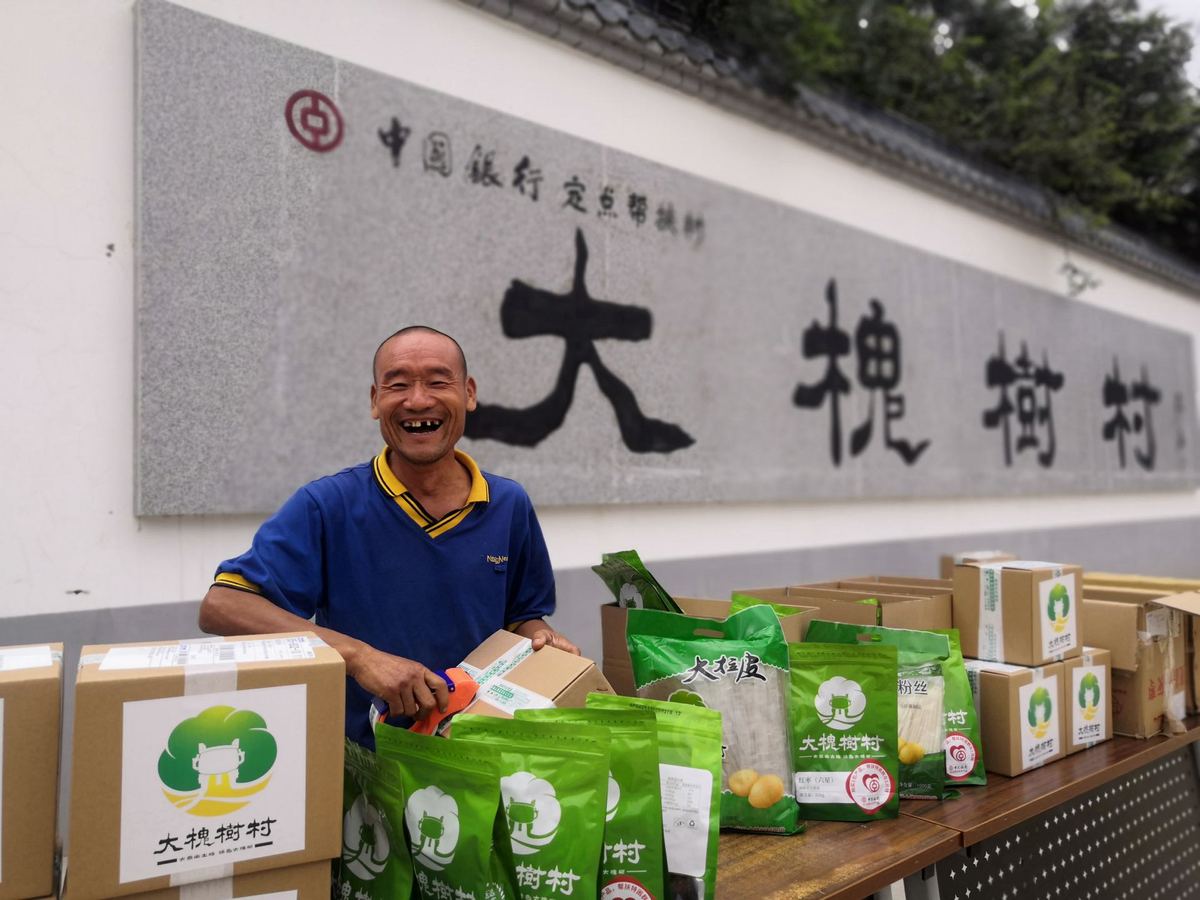E-commerce raises incomes, spirits in Northwest China farming community


"The sound of tape being torn is the most inspiring sound in our village," said Wang Jianfeng, the "first secretary" in charge of poverty relief in the village of Dahuaishu in Chunhua county, Shaanxi province.
The sound was coming from the village's e-commerce station, where villagers were using sealing tape to pack boxes of fruit just collected from farmland.
The packed fruit will be sent to customers all over China, covering 20 provincial regions.
Wang was a manager in the executive office of the Bank of China in Beijing and went to Dahuaishu to serve as the secretary of its Party committee in May 2018.
"When I first came to the village, I was amazed by the delicious cherries, which were not only red and big, but also juicy and sweet," Wang recalled. However, to his surprise, the fruit was difficult to sell because of the lack of a marketing channel, so it was sold to some local business people at a low price.
"As the 'first secretary' who came to help villagers increase their income, I ought to do something. E-commerce should be a good way to sell the fruit at a higher price and give people from other provinces access to it," Wang said.
After a year's preparation, on May 15, the e-commerce station in Dahuaishu started its business. Fruit, nuts and grains from the village could be sold anywhere in China through an e-commerce platform, such as Taobao or Gongyi Zhonghang, which was set up by the Bank of China to help with poverty alleviation.
The station also collaborated with express companies to improve delivery efficiency.
"SF Express is the fastest, and China Post can reach the most remote areas," Wang said.
Connecting with an e-commerce platform was more than enough to sell the village's products. But Wang also decided to build a brand for them to make the products distinguishable from others.
He asked an agency to design a logo for the e-commerce station with the elements of a tree, soil and a large, ancient cauldron used to cook meat. That's because Dahuaishu is where the nation's largest such cauldron - an artifact dating back to the Western Zhou Dynasty (c.11th century-771 BC) - was discovered.
"It's important to help villagers build their confidence," Wang said.
Hao Shimin, a farmer in the village, has seen success.
"Every time I see the logo on the mailbox, a sense of pride comes to my mind," said Hao, 68.
"In the past, I always worried about where to sell my cherries and even thought of giving up planting. But with the assistance of e-commerce, the fruit can be sold all over China, so I decided to plant more next year."
Earlier this year, Hao's wife had surgery for bone disease in her thigh, which was paid for with the 20,000 yuan ($2,800) he earned from selling cherries.
"Thanks to the e-commerce platform that helped me sell the cherries at a good price, my wife was able to have surgery in time," Hao said.
According to Wang, the Dahuaishu e-commerce station receives an average of 200 orders per day. From May 15, 2018, to the end of September, the station raked in 600,000 yuan.
Dahuaishu is not the only place in Chunhua where villagers are using an e-commerce platform to sell goods.
Xi Yijun, 45, who lives in Xijia village, lost his legs in an accident 20 years ago. He ran a little shop to earn a living, and his wife had to do all the farm work.
With the assistance of Gongyi Zhonghang, he began to help his wife sell their farm products.
"At the very beginning, I had no idea how sales would be," he said. "I wondered whether there would be anyone interested in the fruit planted by my wife. But things went beyond my expectations. The first day I ran the business, I got 21 orders, which encouraged me a lot.
"It is inconvenient for me to work without legs, and thus my wife had to do all the work, which made her really tired. There was a time I almost lost confidence in life.
"However, since I joined the e-commerce platform, our sales have become better and I could do all the work on a computer."
According to statistics released by the Bank of China, there are 328 people who live in Chunhua like Xi, who run their own businesses on the e-commerce platform.
"The reason for us to introduce them to e-commerce is not just to help them get rid of poverty, but also to assist with building confidence and expanding horizons," Wang said. "It is important to let them know that with reform and opening-up, Chinese people can do business in a more direct and convenient way."
- China set to establish early pregnancy clinics across 10k hospitals
- Cold front coats Guizhou mountains in rime
- Two dead after unauthorized crossing of Aoshan Mountain
- China reports rise in patents and stronger IP enforcement
- Former senior Guizhou official expelled, faces prosecution
- Chinese mainland pledges to advance cause of national reunification





































